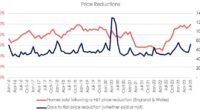
Homeowners racing to overpay their mortgage before their loan rate rises could be making a financial mistake costing them hundreds of pounds.
Overpayments allow mortgage holders to put additional cash towards their home loan to pay off the debt faster and reduce their loan size.
One in four homeowners have paid over and above their monthly mortgage costs this year, Barclays disclosed last month.
A record £6.7 billion was spent on mortgage overpayments in the first three months of this year, according to the Bank of England.
Many homeowners are overpaying while they are still on a low fixed-rate deal before they are forced to remortgage at a higher rate.


Rush: A record £6.7bn was spent on mortgage overpayments in the first three months of this year, according to the Bank of England
Someone who took out a two-year fix two years ago would be paying just 2.52 per cent on average, but would be facing a new rate of 6.84 per cent if they had to remortgage today.
Industry experts are warning this strategy could leave homeowners worse off than if they put the money into a top-paying savings account instead. So who should be overpaying, and who shouldn’t?
Money Mail crunches the numbers.
Savings versus overpayments
As a rule of thumb, you should only overpay your mortgage if the rate is around the same or higher than the rate you can get on the money in a cash savings account elsewhere.
If you can get a higher savings rate, you would usually be better off building up a nest egg instead.
You can use this sum to overpay your mortgage at the point at which the balance tips and your mortgage rate exceeds your savings rate.
Banks and building societies are increasing the amount they pay on savings accounts in response to the Bank of England’s rising base rate.
The best one-year fixed rate account, offered by Atom Bank, pays 6.05 per cent.
The average rate is as high as 5.23 per cent, according to rate scrutineer Moneyfacts Compare.
Nicola Crosbie, a financial planner at wealth manager Schroders, says: ‘If you have a low rate that is fixed for a long time then it may not be worth overpaying now as you could see a better return if you put the money into a savings account instead.’


Rates: Someone who took out a two-year fix two years ago would be paying just 2.52% on average, but would be facing a new rate of 6.84%
For example, take a homeowner who has 25 years left on a £300,000 mortgage, a fixed rate of 2 per cent and two years left on their current deal.
If they overpaid their loan by £200 a month for the next two years, they would save £93.13 in interest during that time, according to broker L&C.
However, if they had put this money into a savings account with a rate of 6.05 per cent for two years, they would have earned £289.36 in interest.
After two years, they would have saved an extra £196.23 by saving instead of overpaying their mortgage.
If they then used the savings lump sum they had accumulated of £5,089 to reduce their mortgage balance, they would save £12,964 in interest over the remaining 23-year mortgage term.
This assumes they remortgage at 5.63 per cent — the average UK mortgage rate over the past 25 years — for the remaining term and keep their monthly mortgage payments at the same level.
By comparison, if they had reduced their mortgage balance through two years of monthly overpayments, and refixed at 5.63 per cent for the remaining 23 years, they would save £12,652 in interest over the same term.
That means someone who puts the money into a savings account and uses it to pay down their mortgage in one go would be better off over the long-term by £312.


Fears: One in four homeowners have paid over and above their monthly mortgage costs this year
If you are able to overpay or save £500 a month, the benefit of saving is even greater.
By the time you paid off your full mortgage, you would be £829 better off, the L&C analysis reveals.
The savings can be even greater if you have a sizable lump sum.
Someone with £10,000 can earn £605 in interest over one year in the top-paying savings account.
However, if they overpaid their mortgage by £10,000, they would save just £190 in interest over the year.
This assumes they have a £300,000 fixed-rate mortgage at 2 per cent, with a 25-year term. They would have £415 more if they opted for a savings account over a mortgage overpayment.
In a second example, if you had a £25,000 lump sum, you could earn £1,437 in interest in a top-paying savings account over one year.
If you overpaid your mortgage by £25,000, you would save £460 in interest over the same year.
Again this assumes a £300,000 fixed-rate mortgage at 2 per cent with a 25-year term.
That means after one year, you would be £977 better off opting for a savings account over mortgage overpayments.


Hikes: Banks and building societies are increasing the amount they pay on savings accounts, in response to the Bank of England’s rising base rate
Overpay to get a better rate
Most High Street lenders will allow you to overpay your mortgage by up to 10 pc of your outstanding balance each year without incurring a fee.
But a handful of banks have made concessions as rates rise.
NatWest currently allows borrowers to overpay by up to 20 per cent each year without paying a penalty.
Anything above this will incur a punitive ‘early repayment charge’, which is typically between 1 and 5 per cent of the amount you still owe.
Overpaying your mortgage could also improve your loan-to-value (LTV) ratio, by increasing the amount of equity you have in your home.
The lower your LTV, the less risky a lender considers you to be and the better the rate it will offer.
This could save you thousands, says Dominik Lipnicki, a broker at Your Mortgage Decisions. Once you overpay your mortgage you cannot access the money again.
Offset for a happy medium?
If you want to use your savings to offset your mortgage without losing access to them altogether, an offset mortgage could help.
These mortgages link your savings account with your mortgage so you get a lower savings rate in exchange for a lower mortgage rate.
For example, if you have a £200,000 mortgage and £20,000 in a savings account offset against it, then you will pay interest only on £180,000 of the mortgage.
Instead of paying 6 per cent interest on £200,000 (£12,000) in a year, you would pay 6 per cent on £180,000 (£10,800) — saving £1,200. Most lenders that offer these products will let you offset your mortgage by up to 10 per cent each year.










